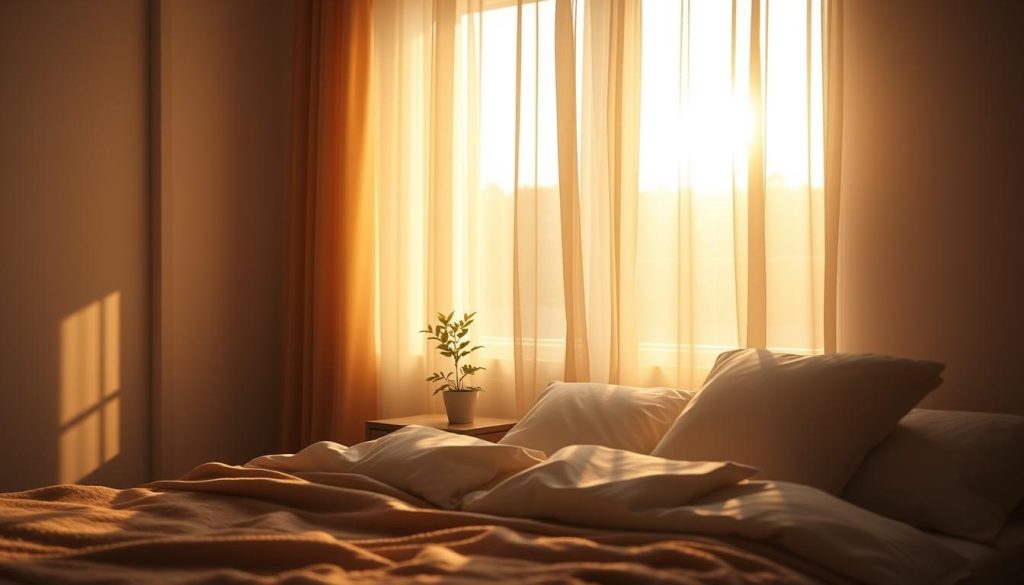Many of us struggle with rest because we often overlook our circadian rhythm. This 24-hour cycle affects sleep, energy, and focus throughout the day. Learning its patterns can bring more balance to daily life.
Aligning habits with this clock is easier than it seems. This guide will share five simple ways to tune into your body’s signals. You’ll get better sleep and higher productivity.
What is Circadian Rhythm?
The circadian rhythm is like an internal clock that tells you when to wake up or go to bed. It helps keep your body in a routine for eating, moving, and resting. Things like light and daily habits can change this schedule.

Definition and Importance
This natural cycle repeats every 24 hours. It helps control hormone release, energy, and body temperature. A steady rhythm means you sleep well at night and wake up feeling fresh.
If your rhythm is off, you might find it hard to sleep or stay alert. This can affect your health.
How It Influences Your Health
Staying on a regular schedule boosts your immune system and mood. Light tells your body when to be awake, and darkness signals sleep. Artificial lights can mess with this natural rhythm.
Small changes, like cutting down on screen time at night or getting morning sunlight, can help. These actions keep your body in sync and improve your health.
How Circadian Rhythm Works
Our bodies have a built-in timekeeper in the hypothalamus. It makes sure our main functions happen in a 24-hour cycle. It controls when we wake up, rest, and even eat, keeping us healthy.

The Biological Clock
A small part called the suprachiasmatic nucleus (SCN) runs our biological clock. It makes sure our body’s processes are in sync by reacting to outside signals. This helps us stay awake during the day and sleepy at night.
Role of Light and Darkness
Sunlight makes us feel more awake, while darkness tells our body it’s time to sleep. Morning light sends signals to the SCN, making us alert. At night, less light means our body starts making melatonin, helping us sleep.
Hormones Involved
Melatonin goes up when it’s dark, helping us sleep. Cortisol, on the other hand, increases in the morning to get us ready for the day. These hormones help us feel balanced, making life easier.
Benefits of a Healthy Circadian Rhythm
A stable internal clock can make a big difference. It helps control important hormones and keeps your sleep-wake cycle natural. When melatonin levels are balanced, nighttime sleep becomes deep and refreshing. Waking up with energy becomes easy when your body’s rhythms are in sync.

Improved Sleep Quality
Good sleep is linked to a well-timed internal clock. When it’s dark, your body starts to relax. This makes falling asleep quicker and waking up feeling refreshed. Regular habits make bedtime more enjoyable and cut down on restlessness.
Enhanced Mood and Energy Levels
Steady daily rhythms can make you feel happier all day. Regular sleep and melatonin levels lead to a calmer mind. Waking up at the same time every day can make mornings more exciting. This sets a positive mood for work, school, or home.
Better Physical Health
When your circadian rhythm matches daylight, your body works better. Strong immune function and a healthy heart depend on these rhythms. Sleeping in sync with the sun can help keep your weight balanced and your body strong.
Signs Your Circadian Rhythm is Out of Sync
A misaligned internal clock can show up in small ways before it gets worse. It often comes from staying up late or not getting enough sunlight during the day. Spotting these signs early can help you get back on track.

Insomnia and Sleep Disturbances
Some people find it hard to fall asleep, while others wake up too early. This can lead to short sleep times and restless nights. Sometimes, your body might want to sleep at odd hours, making mornings tough.
Afternoon Slumps
You might feel really tired after lunch. It’s hard to focus, and you might yawn a lot. These signs show your body’s rhythm is off.
Mood Swings
Feeling moody or irritable can mean more than just stress. It could be a sign that your body’s clock is out of sync. Not getting enough sunlight in the morning might play a role.
| Sign | Typical Experience |
|---|---|
| Insomnia | Ongoing trouble falling or staying asleep |
| Afternoon Slump | Low energy and reduced focus later in the day |
| Mood Swings | Frequent irritability or sudden emotional changes |
Steps to Reset Your Circadian Rhythm
Many people have trouble sleeping at regular times. This is especially hard for those who work shifts. Having a routine helps your body sleep better.

Creating new habits can help your body find balance. Here are three simple steps to follow.
Step 1: Establish a Sleep Schedule
Choose the same times to go to bed and wake up every day, even on weekends. Pay attention to when you feel most awake. If your work schedule is different, pick times that work for you.
Step 2: Create a Bedtime Routine
Start by dimming the lights and drinking herbal tea. Light stretching or reading can signal to your brain that it’s time to relax. These small steps help you calm down and sleep better.
Step 3: Limit Screen Time Before Bed
Devices like phones and tablets give off blue light that can hurt your eyes. Try to turn them off at least 30 minutes before bed. Making your bedroom a phone-free zone can help you sleep more soundly.
Importance of Natural Light Exposure
Our internal clock needs daytime light to work right. Morning light helps set our body’s rhythm, boosting energy and mood. Studies show that sunlight reduces sleep disorders by controlling sleep hormones.
Getting light early in the day has big benefits. Midday sun boosts vitamin D and keeps us alert. It also helps us focus better and feel emotionally good.
Best Times for Sunlight
Going outside early tells our body to stay awake and feel fresh. Light at midday keeps us energized, helping us sleep better later.
How to Incorporate More Daylight
- Open blinds right after waking to allow natural light inside
- Take lunch breaks outside to refresh your mind and body
- Position desks near windows for a steady supply of bright rays
Making small changes in our day can help us sleep better and feel better overall. Daylight improves our mood, work, and body rhythms.

Role of Diet in Circadian Rhythm
Eating patterns are as important as light in setting our internal body clock. Eating balanced meals helps our energy levels match the day-night cycle. This leads to more consistent routines and better sleep.
Changing when we eat can mess with these signals. Eating foods that calm the body before bed helps. But eating late can make us feel awake when we shouldn’t be.
Foods that Support Sleep
Some foods help make melatonin, which helps us relax. Tryptophan, magnesium, and calcium are key for calming the nervous system.
- Turkey and milk contain tryptophan.
- Spinach and almonds supply magnesium.
- Yogurt and kale provide calcium.
Meal Timing and Its Effects
Eating late can confuse our brain about when to sleep. Eating at the same times every day helps our body clock stay in sync. This way, our body knows when to rest.
Drinking too much caffeine or sugary drinks before bed can keep us awake. It’s important to stay hydrated but avoid these drinks close to bedtime.
| Food | Key Nutrient | Potential Impact on Sleep |
|---|---|---|
| Turkey | Tryptophan | Helps boost melatonin |
| Almonds | Magnesium | Promotes muscle relaxation |
| Yogurt | Calcium | Supports healthy melatonin levels |
Exercise and Circadian Rhythm Alignment
Staying active can tune your circadian system, offering a pathway to deeper rest. When workouts match natural body cues, it becomes easier to fall asleep and wake up feeling more refreshed.
Best Times to Exercise
Morning or early afternoon sessions help raise core temperature, paving the way for restful nights. Some individuals find a late-day workout soothing after busy schedules, easing tension and promoting sleep without too much energy surge. It is wise to pay attention to personal preferences, ensuring no intense exercise right before bed.
The Impact of Physical Activity on Sleep
Regular movement builds a sense of natural tiredness that supports a more stable sleep routine. A planned fitness schedule can align with meal timing and other daily habits, resulting in better control over bedtime. Balancing consistent exercise with healthy lifestyle choices often leads to improved relaxation and optimized energy levels.
Mindfulness and Relaxation Techniques
A calm mind helps us sleep better. Stress can mess with our natural sleep patterns. So, using special techniques can really help.
These techniques calm our nervous system. They give our body a chance to rest and recharge.
Meditation and Its Benefits
Just a few minutes of quiet can calm our minds. Apps like Headspace and Calm offer guided meditations. They help us focus and be patient.
This calmness helps our hormones stay balanced. It also keeps our sleep cycle regular. Regular meditation makes us stronger, helping us handle daily life better.
Breathing Exercises for Better Sleep
Deep breathing tells our body to relax. The 4-7-8 method is easy: breathe in for four, hold for seven, and breathe out for eight. This pattern helps us relax and sleep better.
Doing this regularly also helps our heart rate. This leads to better sleep overall.
| Breathing Pattern | Duration (Seconds) |
|---|---|
| Inhale | 4 |
| Hold | 7 |
| Exhale | 8 |
Common Myths About Circadian Rhythms
Myths often block our path to understanding. Some ideas about our internal clock can mislead us. It’s important to clear up these misconceptions to help us feel rested.
“Everyone Needs 8 Hours of Sleep”
Sleep needs differ from person to person. Athletes might need more rest for their intense training. Others might do well with less sleep. Finding what works for you is better than following a one-size-fits-all rule.
Feeling refreshed in the morning is more important than just sleeping for 8 hours.
“Napping is Always Bad”
Short naps can actually increase energy and focus. A 20-minute nap can be a quick pick-me-up for those working shifts or feeling tired in the afternoon. It’s all about timing and length.
Long naps can mess up your bedtime routine. But a short, planned nap can be very helpful. It’s about finding the right balance for you.
When to Seek Professional Help
Trying new sleep strategies is normal. But if insomnia or chronic fatigue lasts, it’s time to seek help. Experts say long-term sleep issues can harm mood and health. If nothing works, getting professional advice is a good idea.
Signs You Should Consult a Specialist
If you can’t sleep for weeks, it’s a sign. Waking up tired every day is another red flag. Mood swings could also mean your body’s rhythm is off.
A sleep specialist can find the cause. It might be work hours, stress, or a health issue. They can help you get back to sleeping well.
Types of Professionals to Consider
Start with your primary care doctor. They can check for simple issues. Then, they might send you to a sleep specialist.
Psychologists focus on mental health and sleep. Neurologists deal with brain functions that control sleep. There’s no shame in asking for help. It can lead to better sleep and more energy.

